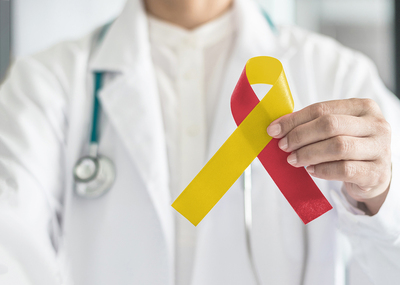
Unfortunately, HIV and substance abuse go hand-in-hand in the LGBTQ community.
While HIV is no longer viewed as a life sentence due to advancements in prevention and treatment, it remains a major public health crisis in the US — especially among segments of the LGBTQ community, according to the Human Rights Campaign. Unfortunately, some of the factors that make LGBTQ people vulnerable to HIV also make them vulnerable to substance abuse. The converse is also true. Here’s a closer look at the issue, along with why acknowledging co-occurring conditions is such an important part of treatment.
A Logistical Link
For starters, it’s important to note that the relationship between HIV and alcohol and drug use is a logistical one.
Says research published in AIDS Patient Care and STDs, “Alcohol and drug abuse play important roles in driving HIV transmission and clinical course. Sharing of injection drug use (IDU) equipment remains an important mode of HIV acquisition. Use of alcohol and non-injection drugs is also associated with increased risk for HIV acquisition because of exchange of sex for drugs or money, sexual disinhibition resulting from drug or alcohol use, and related high-risk sexual behaviors. Indeed, HIV and alcohol/drug use have been termed ‘twin epidemics’ because of their interconnectedness.”
The Role of Discrimination
The link between the two phenomena are more than merely logistical; they’re also social. Members of the LGBTQ community are subject to many forms of discrimination. Explains the Human Rights Campaign, “Dealing with the potential consequences of bias and discrimination – job loss, homelessness, lack of healthcare insurance – often results in LGBTQ people engaging in behaviors that facilitate the spread of HIV. For example, in the face of persistent employment discrimination, many transgender women are left with few other options but to engage in survival sex work in order to meet their most basic needs.”
Discrimination can also lead LGBTQ people to drug use and addiction. “People who identify as lesbian, gay, bisexual, or transgender (LGBT) often face social stigma, discrimination, and other challenges not encountered by people who identify as heterosexual. They also face a greater risk of harassment and violence. As a result of these and other stressors, sexual minorities are at increased risk for various behavioral health issues,” says the National Institute on Drug Abuse (NIDA).
These behavioral health issues, meanwhile, increase the risk of attempts to self-medicate with drugs and alcohol. Continues NIDA, “Sexual minorities with SUDs are more likely to have additional (comorbid or co-occurring) psychiatric disorders. For example, gay and bisexual men and lesbian and bisexual women report greater odds of frequent mental distress and depression than their heterosexual counterparts. Transgender children and adolescents have higher levels of depression, suicidality, self-harm, and eating disorders than their non-transgender counterparts. Thus it is particularly important that LGBT people in SUD treatment be screened for other psychiatric problems (as well as vice versa) and all identifiable conditions should be treated concurrently.”
The mere fact of living with HIV has also been linked with high levels of stress pertaining to everything from disclosure concerns to stigmatization. “It has been suggested that the principle motivation behind drug use is to escape or avoid experiences of negative affect or stress. HIV-positive adults also report using drugs to cope with stressful situations and with emotional distress,” concludes research published in the academic journal, Psychology of Addictive Behaviors.
Making matters even worse? Only a small percentage of people living with the US consistently take the medication which could help them manage the disease. Factor in lack of adequate substance abuse treatment programs for LGBTQ individuals, and the situation can seem quite hopeless — but it doesn’t have to be.
Acknowledge and Treating Comorbidities
The term “comorbidities” refers to the simultaneous presence of two or more diseases or conditions in a patient. It follows that not only are LGBT individuals more likely than non-LGBT individuals to have HIV and substance abuse issues, but they’re also more likely to have comorbidities which complicate treatment and recovery. That said, research indicates that acknowledging these comorbidities through targeted treatment programs for LGBTQ addicts can lead to better outcomes.

Acceptance – -from themselves and from others — is a vital part of recovery.
What, specifically, should these targeted programs include? Proposes NIDA, “Current research suggests that treatment should address unique factors in these patients’ lives that may include homophobia/transphobia, family problems, violence, and social isolation.” Additionally, incorporating an educational component can help addicts understand their disorders in order to overcome them.
The problem? Just 7.4 percent of programs offer these specialized services. Enter St. Louis drug rehab facility Harris House. In offering specialized treatment programs focused on acknowledging the complex factors impacting this community — along with the multi-factored elements of treatment — Harris House is well-positioned to help LGBTQ individuals address their unique challenges and start down the path toward recovery. Call us to today to learn about admissions.







